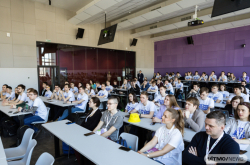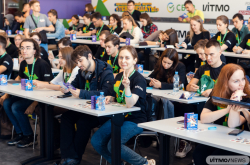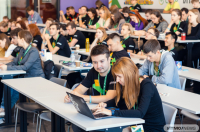Alexander Chezhegov has been working on research projects since his second year at university. In addition to studying at MSU’s Faculty of Physics, he works in MSU’s Laboratory of Nanophotonics and Metamaterials, where he conducts research in the field of plasmonics. He studies magnetoplasmonic crystals, nanostructured surfaces of film-coated magnetic metals. Researchers in the laboratory are currently working on creating a highly sensitive magnetic field sensor using these crystals. They have already developed a prototype of such a sensor.
Last year, the student decided to take part in the Photonics track of the “I am a Professional” National Student Competition, while in January 2018 he came to ITMO University to participate in the “It’s Your Call!” Winter School. In addition to attending lectures, he also took part in the Semi Hackathon, during which students from all across Russia worked in interdisciplinary teams on their own research projects.
“At the Semi Hackathon, we were offered a task on nanomaterials. First, we planned to work on a three-dimensional display, but soon realized that it was not that simple. So we decided to develop a hydrophobic coating for solar cells instead. The coating can be compared to a lotus: if you let a drop of water fall onto the surface of the lotus leaf, the drop will stay right there, the leaf won’t absorb it,” says Alexander. “Such coatings can be used to make cleaning solar cells easier.”

While working in the laboratory, the student established some useful connections, including ones with ITMO University staff who offered him to do an internship in St. Petersburg. So this summer, Alexander spent a month doing an internship at ITMO’s Research Center of Nanophotonics and Metamaterials.
About the internship at ITMO
Alexander’s supervisor at ITMO was Fedor Benimetsky, an ITMO University PhD student and researcher at the Research Center of Nanophotonics and Metamaterials. The research project Alexander worked on was supported by a megagrant (a large research grant awarded by the Ministry of Education and Science) and coordinated by Prof. Maurice Skolnick from the University of Sheffield, as well as Ivan Shelikh, head of ITMO University’s Laboratory of Low-dimensional Quantum Materials.
The project is aimed at developing new ultrafast low-energy integrated polariton devices. An international research group has already managed to produce a prototype of a solid-body crystal lattice from hybrid photon-electron quasiparticles, polaritons. In the resulting polariton lattice, the particles’ energy does not depend on their speed. At the same time, the lattice’s geometry, particle concentration and polarization properties can still be modified. Results of the study were published in Physical Review Letters. To learn more about the megagrant, read our article.
“We mostly work on tasks from the realm of fundamental science. But if we’re talking practical implications of our research, it can be used for developing new devices which will be faster and much more energy-efficient. As part of our megagrant research program, we study the behavior of exciton-polaritons in the dichalcogenides of transition metals strongly tied with optical metasurfaces modes. Alexander joined us in measuring the reflection spectrums of photonic structures. These structures are very interesting as they support the high-quality optical modes, which we established after measuring the spectrums. Alexander also experimented with production of the two-dimensional materials like molybdenum diselenides and graphene,” comments Fedor Benimetsky. “I think that internships like this one are very beneficial for students as they help them experience different working environments and approaches and thus contribute to their personal and professional development.”

Alexander Chezhegov adds that he was given a complete carte blanche to work as he wished to. His internship arrangements just involved joining a research team and adapting to its usual working rhythm. Research activities began in the morning and oftentimes finished late in the evening depending on the amount and complexity of the tasks the scientists were working on.
“I was lucky enough to witness how the monolayers of transition metals dichalcogenides were made. These are two-dimensional, one atomic layer-thick films that are manufactured by the process of mechanical splitting. Thus far, we’ve done a lot of research on MoSe2 monolayers. We transferred these monolayers onto a pre-made silicon oxide template covered with a layer of Ta2O5 that was etched with a periodic texture in the form of a lattice. What we got in the end was a sort of a nano-pie that consisted of different materials and was topped with the monolayer. Our next task was to choose a matching lattice geometry in order to be able to explore a strong tie between exciton and photon occurring in obtained samples through the microscopic evaluation of second focal planes and light spectroscopy methods. To improve the spectrum assessments, all measurements were conducted at extremely low temperatures in the range of 6-7 degrees Kelvin,” explains Alexander Chezhegov.
Apart from that, the internship gave Alexander the chance to visit the St. Petersburg National Research Academic University of the Russian Academy of Sciences, which is one of ITMO University's partner institutions. The research center associates showed the student around and introduced him to their work. Alexander was especially interested in their research on photoresist application and the development of the new probing methods, which he plans to use in his laboratory work at Lomonosov Moscow State University.
“Thanks to my ITMO University internship, I’ve also learned to conduct research at low temperatures using cryostat refrigerators. It was very useful as these methods were completely new to me,” shares Alexander. “I really enjoyed the working atmosphere here; my colleagues were all very dynamic and friendly, and we were always holding group meetings to discuss our work, which I found very helpful.”
Plans for the future

Upon returning to MSU, Alexander will participate in a workshop where he wants to share his internship experience. If his research findings get his colleagues interested, the student will carry on working in this field. As for long-term plans, Alexander intends on continuing with his scientific research as part of his future Master’s and PhD studies, though he hasn’t decided yet whether he’ll go for a fundamental science degree or choose the more practice-oriented one.
“While my work at ITMO University leaned on the more theoretical aspects of science, my work in Moscow was largely practice-based. At the moment I’m interested in both fundamental and applied research, but I know I’ll need to make a choice further on. Either way, I’d like it if science was more closely tied in with the industry. Right now the latter isn’t very eager to engage with fundamental research. I want to see that change,” says Alexander.



